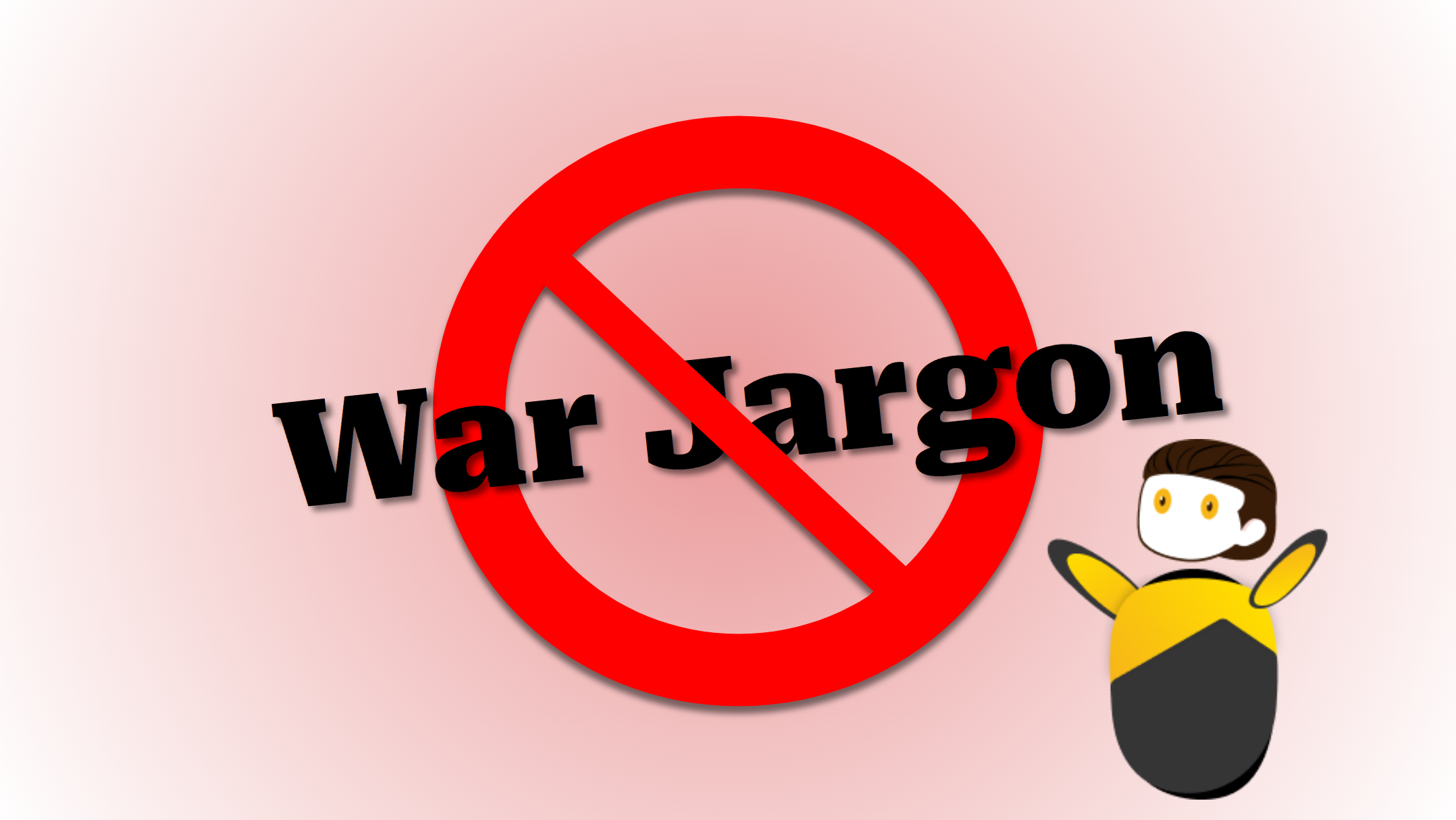Published on April 16, 2025
Using war jargon at work?

Ever been in a war room trying to come up with a killer go-to-market strategy? Maybe your manager asked for a battle plan while you were still nursing your battle scars from the last product launch. Corporate-speak can get… intense. We’ve all heard (or said) things like:
- “Let’s nuke the competition!”
- “We need some serious ammo for this pitch”
- “She’s a straight shooter”
- “We’re in the trenches together”
Sometimes it’s tossed around jokingly; other times, it’s just… reflex. It’s part of that unspoken dialect of business meetings, strategy sessions, and LinkedIn posts. But if you step back for a moment, it’s worth asking: Why does the language of work so often sound like the language of war?
For Some, War Is Real
For most of us, thankfully not. But for some—our colleagues, customers, and fellow humans —war isn’t a metaphor. It’s real. And ongoing. They’ve lived it, lost loved ones to it, or carry memories and scars that don’t fade when the quarterly numbers come in.
So when we casually toss around phrases like “war chest”, “purple heart”, or “blitz”, it can hit harder than we intend. Not because we mean harm—but because we forget that language, like anything else, matters.
Imagine sitting in a QBR meeting while quietly coping with the trauma of real war. Hearing your teammates describe Q2 sales as a “turf battle” might not land the way they think it does.
We’re Trying to Unlearn
I’ll be honest—I’ve definitely used this language myself after 2 decades in the corporate world. But over the past several years, I’ve made a conscious effort to unlearn it. Because words matter.
At the startup I co-founded, DataIAm, we try to keep our language intentional, positive, and—most importantly—human. We don’t believe another vendor has to “lose” for us to “win the battle”. We can all succeed by focusing on what matters: helping customers succeed.

Suggestions, If We May
Here are some alternatives to lighten things up without losing your point:
| War-ish Jargon | Non-War Alternative | Fun / Playful Alternative |
|---|---|---|
| War Room | Project Room | Catalyst Room |
| Hit the Ground Running | Jumpstart | Launch Mode, Turbo Boost |
| Battle Plan | Action Plan | Game Plan |
| In the Trenches | Hands-On | Rolling Up Our Sleeves |
| Nuke the Competition | Outperform | BBC: Be Better than the Competition |
| Ammo for the Pitch | Talking Points | Mic Drop Material |
| Guerrilla Marketing | Scrappy Marketing | LoCoHi Marketing: Low-Cost, High-Impact |
Still cool. Just a bit more… compassionate.
Let’s Make Work Feel More Human
Small changes in language can create space for more inclusivity, empathy, and respect. Especially in global, remote-first work cultures—where we don’t always know what our teammates have lived through—it pays to be thoughtful.
Let’s make our workspaces more inclusive, intentional, and respectful of all the life experiences people carry with them.
About the Author
Zeb Mahmood has spent his career unlocking business value by moving, fixing, and loading data—first as an engineer, then as a product leader, and now as a cofounder.
With 2 decades in product management, 9 years at Salesforce, and hands-on experience in early-stage startups, he’s learned a simple truth: data is the lifeblood of every business. But when it’s messy or trapped in spreadsheets, it can’t drive impact.
That’s why Zeb cofounded DataIAm — a Fix & Load AI built for Salesforce Admins and data handlers who just want their data to work. No frustration. No failed imports. Just clean, reliable data that loads seamlessly into Salesforce and delivers results.
Zeb believes great products don’t win on tech alone — they win through empathy. Empathy for users, buyers, partners, and the people building the product every day.
